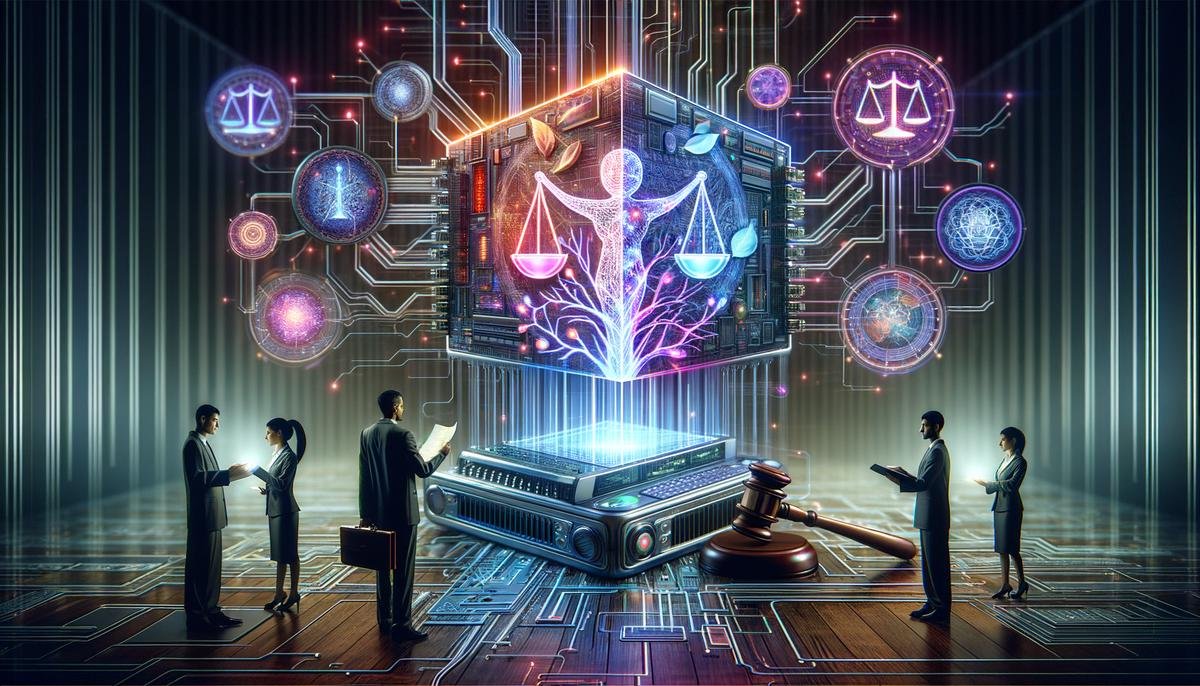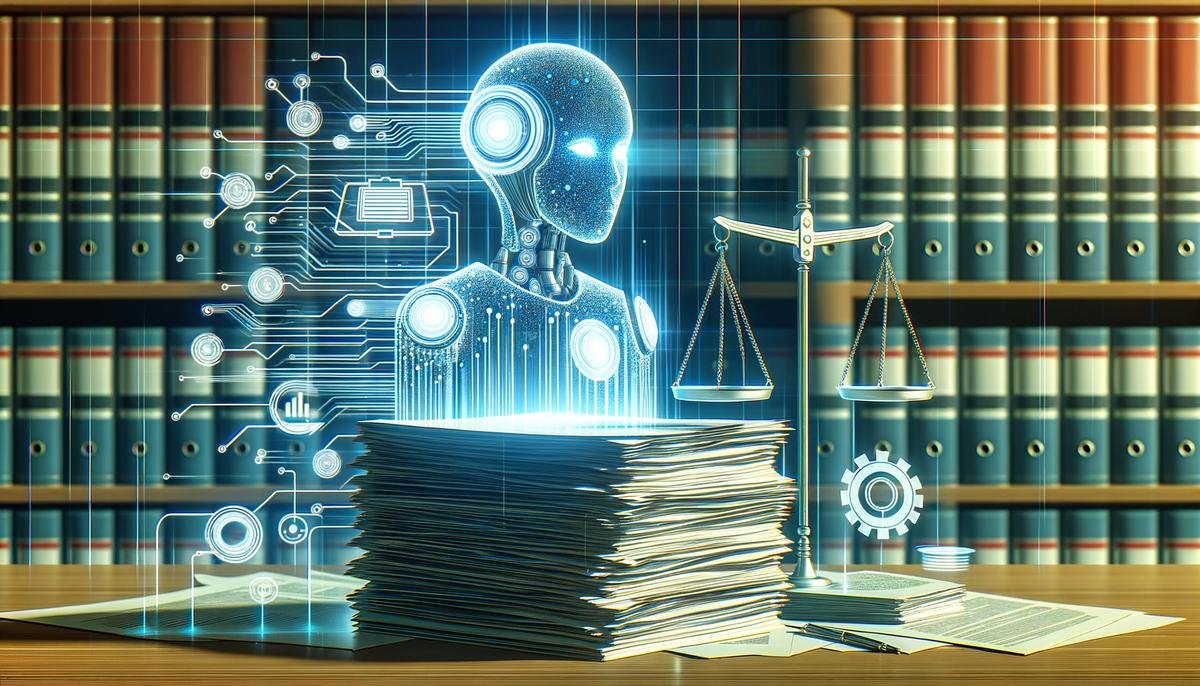The landscape of legal services is witnessing a significant transformation, courtesy of artificial intelligence. This shift towards AI-driven tools and applications is redefining the efficiency and effectiveness with which legal professionals carry out their duties. From automating routine tasks to providing predictive insights and enhancing research capabilities, AI is not just an adjunct but a central player in the modern legal arena. As we examine the multifaceted impact of AI on legal services, it becomes clear that this technology is not just reshaping tasks but also the very fabric of legal research and analysis.
Overview of AI in Legal Services
Artificial Intelligence has dramatically changed how legal professionals approach their work, offering tools for smarter, more efficient operations. AI’s role begins with document review, a core task in legal practices that involves sifting through thousands of documents to identify ones relevant to a case. This process, once manual and extremely time-consuming, is now accelerated by AI algorithms, which can quickly scan, identify, and sort documents based on relevance, saving hours of labor.
Moreover, case predictions have seen a revolutionary upgrade with AI. Legal professionals can use AI algorithms to analyze previous case outcomes and predict future case results with higher accuracy. This capability not just streamlines the process but assists lawyers in developing more effective case strategies.
Legal analytics powered by AI offers a profound understanding of trends within court decisions, judge behavior, and the likelihood of winning a case in specific legal areas. This form of deep analysis equips legal teams with strategic insights that were previously impossible to quantify or too cumbersome to uncover due to the sheer volume of data.
AI also enhances due diligence by automating the verification of facts and figures in legal documents, a crucial but time-intensive task. Automated checks reduce human error, ensuring more accurate and reliable due diligence reports.
In contract analysis, AI applications excel at comparing contract documents against existing laws and regulatory standards, highlighting areas of non-compliance. This not only reduces the risk for businesses but significantly speeds up the process of contract approval.
Chatbots and virtual assistants, fitted with basic legal knowledge, are becoming frontline customer service tools in law firms. They handle preliminary consultations, schedule appointments, and provide users with quick legal advice for common queries. This technology streamlines client interaction, making legal services more accessible.
E-discovery, another area transformed by AI, automates the process of identifying, collecting, and producing electronically stored information in response to a legal request. This has drastically reduced the time and expense associated with discovering relevant electronic evidence.
Legal drafting tools powered by AI assist attorneys in drafting documents faster by suggesting relevant clauses and legal precedents. They continually learn from new documents, improving their suggestions over time and ensuring that legal professionals can draft contracts, pleadings, and other legal documents with increased efficiency and accuracy.
The role of AI in modern legal services doesn’t stop at just simplifying tasks; it’s reshaping the landscape of legal research itself. AI-powered research tools can process large volumes of legal texts to identify hidden patterns, relevant case laws, statutes, and legal doctrines, empowering lawyers to conduct thorugh research with a level of speed and precision that was previously unattainable.
By automating routine tasks, offering predictive insights, and enhancing research capabilities, AI not only enhances productivity but also allows legal professionals to focus more on the strategic aspects of their work. As these technologies continue to evolve, they promise even greater advancements in how legal services are delivered, emphasizing the unstoppable march of AI integration into the practice of law.

Automating Legal Research
Natural Language Processing (NLP) works like a high-powered magnifying glass, zeroing in on crucial phrases and terms in voluminous legal documents. This technology allows systems to decipher complex legal language, extract pertinent information, and even discern the context and sentiment behind the written words.
Machine learning takes previous legal cases and sifts through them with the speed and accuracy that no human can match. It identifies patterns and precedents that are relevant to the current case at hand, pulling from historical data to suggest possible outcomes. Unlike a traditional legal researcher, who might use intuition and experience to guide their search, AI’s algorithms are based on hard data and statistical probabilities.
The streamlining of the discovery process with AI involves sifting through terabytes of data, from emails and text messages to files and documents, to find evidence pertinent to a case. Gone are the days when legal teams had to manually comb through mountains of paperwork. Now, AI can scan, identify, and flag relevant pieces of information in a fraction of the time.
Leading AI legal research tools like ROSS Intelligence and LexisNexis leverage NLP and machine learning to offer powerful search capabilities that go beyond simple keyword matching. These platforms understand the context of a search inquiry and can bring back results that are the most relevant, even if they do not exactly match the search terms.
Moreover, AI legal research tools continually learn from interactions with the data and queries posed by legal professionals, which means they get smarter over time. Every query refined, every document scanned, contributes to the enhancement of these tools, making the next search more precise and tailored to the user’s needs.
The integration of AI in automating legal research tasks has not only made the process more efficient but also more comprehensive. Legal professionals can now engage in a more strategic review of their findings, focusing on analysis and synthesis rather than getting bogged down with locating potential sources of information.
Finally, the impact of AI on automating legal research extends to the realm of accessibility. Small firms or independent practitioners who may not have the resources for extensive legal research teams can now access powerful tools that level the playing field, giving them access to the same vast bodies of law and precedent as larger entities.
As legal professionals continue to embrace these AI tools, the scalability and precision of legal research grow, shaping a future where informed legal decisions are made faster and with greater confidence, all thanks to technology’s hand.

AI in Legal Analysis and Predictions
AI’s contribution to risk assessment in the legal sector is transformative, allowing firms to evaluate the potential outcomes and pitfalls associated with different legal strategies. By analyzing historical data, AI can identify patterns and correlations that may not be immediately apparent to human analysts, thereby providing a more nuanced understanding of potential legal risks. This capability enables legal professionals to advise their clients with greater confidence, based on data-driven insights rather than solely on intuition or past experiences.
The strategic decision-making process benefits immensely from AI’s ability to synthesize vast amounts of information. Lawyers leveraging AI can sift through precedent-setting cases, relevant statutes, and regulatory guidelines much more efficiently than traditional methods. This increased efficiency not only accelerates the legal analysis process but also allows attorneys to explore a wider range of strategies and precedents, ensuring that their chosen course of action is both innovative and solidly grounded in law.
Ethical considerations center on the impartiality and transparency of AI systems. As AI begins to play a larger role in predicting legal outcomes, it’s vital that these systems are programmed to avoid inherent biases that could affect their predictions. Ensuring that AI applications in the legal field are transparent about how they arrive at their conclusions is crucial for maintaining trust among all parties involved. Moreover, the ability of AI to consider a multitude of factors impartially can help mitigate the impact of unconscious biases that may influence human decision-making.
Questions of accuracy in AI predictions highlight the importance of continuous refinement of algorithms through machine learning. While AI tools can provide valuable insights about potential case outcomes, it’s essential to recognize the limitations inherent in predictive analytics. The accuracy of AI predictions depends greatly on the quality and breadth of data upon which these predictions are based. Acknowledging this, many AI systems now incorporate mechanisms to learn from new data, enabling them to refine their predictions over time.
AI also aids in constructing legal arguments and preparing cases by analyzing trends in judicial decisions and identifying factors that influence case outcomes. By processing and learning from the results of similar past cases, AI tools can suggest strategies that have historically been successful, allowing lawyers to tailor their arguments to align with trends in judicial thinking.
Risk assessment tools powered by AI go beyond just predicting outcomes; they can evaluate the financial implications of different legal strategies. By analyzing past cases in particular jurisdictions or under certain judges, these tools can forecast not only the likelihood of success but also potential costs and damages. Consequently, legal professionals can present their clients with a well-rounded analysis of their options, incorporating both legal feasibility and financial viability.
As AI continues to evolve within the legal sector, its integration with blockchain technology promises further enhancements in security and efficiency. Blockchain can provide a verifiable and unchangeable record of legal documents and case histories that AI applications can analyze. This integration could lead to even more nuanced risk assessments and strategy development by ensuring that AI systems have access to comprehensive and tamper-proof data.
In summary, AI’s role in legal analysis and outcome prediction extends beyond merely automating routine tasks; it encompasses critical support in risk assessment and strategic decision-making, grounded in ethical practices and an ever-improving accuracy rate. Engagement with these advanced technologies enables legal professionals to navigate the complexities of law with a superior caliber of precision and insight.

Challenges and Ethical Considerations
Data privacy concerns emerge first and foremost when discussing AI in legal services. Personal information and confidential case details must be protected, but AI systems require access to vast datasets for learning and analysis, posing significant privacy risks. The challenge lies in ensuring AI tools comply with stringent data protection legislations, like the General Data Protection Regulation (GDPR) in the European Union, while still fully utilizing their capabilities.
>Bias in AI algorithms stands as a daunting roadblock. Despite their advanced capabilities, AI systems learn from existing data, which can include past human biases. This can lead to skewed outcomes disadvancing certain groups of people when AI tools assist in legal decision-making or juristic predictions. The tech industry strives to minimize these biases, yet completely eliminating them remains a pivotal challenge.
>Regarding the legal sector’s workforce, the deployment of AI brings anxieties related to job displacement.
Routine tasks automated by AI could lessen the demand for paralegals and junior lawyers, traditionally relied upon for this work. This not only impacts employment opportunities but may also reshape the pathway for gaining practical legal experience.
AI’s accountability in judicial outcomes fuels an ongoing debate. If an AI system contributes to or directly influences a legal decision, pinpointing accountability becomes muddled. Is it the developers who designed the AI, the legal professionals who used it, or the AI itself? Without clear guidance on responsibility, using AI in sensitive legal conclusions may spawn legal and ethical complexities.
Transparency in how AI makes decisions or suggestions in legal contexts is crucial for gaining trust and ensuring fairness. If the decision-making process of these tools is opaque, understanding the basis of their conclusions or detecting potential errors and biases becomes extraordinarily difficult. Legal professionals and clients alike must have confidence in the integrity and reliability of AI conclusions or risk undermining the justice system’s foundational trust.
Lastly, intellectual property concerns orbiting AI-generated content in the legal domain raise questions. As AI begins to draft pleadings, motions, or even whole contracts, the delineation of ownership over these documents gets blurry. Sorting out intellectual property rights for AI-generated legal documents without stifling innovation remains an imperative yet challenging task.
Each of these challenges and ethical considerations underscores the tension between leveraging cutting-edge AI technology to enhance the efficiency and efficacy of legal services and ensuring these advances do not compromise privacy, fairness, or the human element at the core of the legal system.

In conclusion, the integration of artificial intelligence into legal services marks a pivotal shift in how legal professionals approach their work. By automating routine tasks, offering predictive insights, and enhancing research capabilities, AI is not merely a tool for efficiency but a transformative force that enables lawyers to focus more on strategic aspects of their work. This evolution underscores the critical role of AI in shaping the future of legal services, promising advancements that will continue to redefine the delivery and effectiveness of legal assistance.




